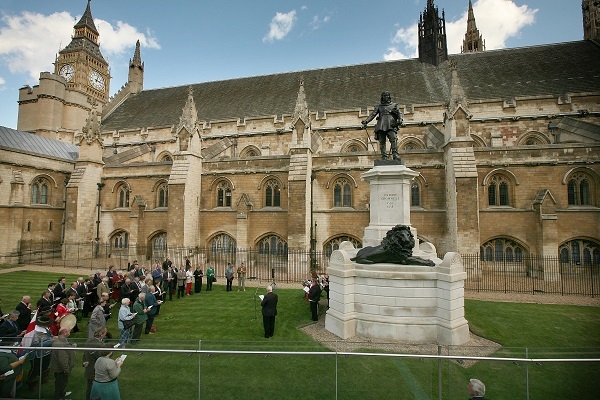‘To Oliver Cromwell’
Cromwell, our chief of men, who through a cloud
Not of war only, but detractions rude,
Guided by faith and matchless fortitude
To peace and truth thy glorious way hast ploughed,
And on the neck of crowned fortune proud
Hast reared God’s trophies and his work pursued
While Darwen streams with blood of Scots imbrued,
And Dunbar field resounds thy praises loud,
And Worcester’s laureate wreath; yet much remains
To conquer still; peace hath her victories
No less than those of war; new foes arise
Threatening to bind our souls in secular chains:
Help us to save free conscience from the paw
Of hireling wolves whose gospel is their maw.
This sonnet was written in 1652 when Milton was part of Oliver Cromwell’s civil service. He was sitting on a committee considering plans to establish a new national church with ministers paid by the state. Milton believed that this would undermine the religious freedoms which had emerged during the civil wars. Like Cromwell himself, he believed in absolute freedom of religious conscience (for Protestants anyway). The ‘hireling wolves’ who would ‘bind our souls in secular chains’ are his way of describing the proposals. The sonnet urges Cromwell to stick to his instincts.
When you want someone’s help, it’s a good idea to be nice about them. So Milton pays tributes to Cromwell the conquering hero. He draws attention to his three great victories against Scottish armies – at Preston in 1648 (near the River Darwen), at Dunbar on September 3 1650 and, exactly one year later, at Worcester. These were the victories that secured the new English republic.
However, the poem is haunted by two biblical verses which hover in the background and allow triumph to slide into warning. They are the last two verses of I Corinthians, chapter 13:
For now we see through a glass, darkly; but then face to face: now I know in part; but then shall I know even as also I am known.
And now abideth faith, hope, charity, these three; but the greatest of these is charity.
Cromwell was sure he was doing God’s work. After the momentous victories over Charles I at Marston Moor and Naseby, he asked what the meaning was of these providential victories over his enemies in which ‘God made them as stubble to our swords’. His answer was that of a man who knows that divinity flows through his acts: ‘is it not to see the face of God?’.
Revolutionaries, from France to Russia, have known the exhilaration of being sure that they are instruments of destiny. They feel that, with ridiculous ease, they are sweeping away the delusions of centuries. Now, at last, the world is being made real. Truth is flowering.
Cromwell was more than a man to his age. He was already a prophet of the deed, a myth and a myth-maker who had sliced through ‘a cloud not of war only, but detractions rude’ to release ‘peace and truth’. He has not only ‘pursued’ but accomplished God’s work on earth. This is the first biblical verse. Cromwell has seen the face of God, and brought England into His presence.
But there are two dangers, one to England and one to Cromwell. First, England could slip back into darkness if religious liberty is denied. And if a nation can slip into darkness, so too can a man. The last verse of I Corinthians 13 celebrates the virtues of ‘faith, hope, charity’, but declares that ‘the greatest of these is charity’. Cromwell has faith and hope. In his military campaigns he was ‘Guided by faith and matchless fortitude’. But what of ‘charity’? There is little charity in commanding a slaughter after which a river ‘streams with blood of Scots imbrued’. The violence of civil war is shocking and brutal. So is crowing triumphantly over a beheaded king. This is what Milton means when he says that Cromwell ‘on the neck of crowned fortune proud hast reared God’s trophies’. Is this violence God’s work?
Is Milton condemning Cromwell? No. Milton’s praise for Cromwell is honest but ambiguous. He is still the man of destiny and his power is glamorous as well as disturbing. We shouldn’t conclude that Milton sees Cromwell’s battles as regrettable necessities. They remain genuinely ‘glorious’. Mystery rather than moral lies at the heart of this sonnet. Like the God of the Old Testament, Cromwell’s role in history is terrible, wrathful, just and great. Just make sure you don’t stop doing God’s work, the conclusion might be. Because take that away, and all you’re left with is violence, cruelty, and tyranny.





Comments